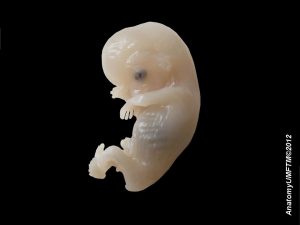
By Prof Ian Jones from Cardiff University.
When it comes to taking antidepressants in pregnancy, women and their doctors have a difficult decision to make. Depression in pregnancy and following childbirth (the postpartum period) is common and has potentially serious consequences. Suicide is a leading cause of maternal death in the UK.
However, a number of studies over the past ten years have reported problems associated with taking antidepressants during pregnancy. These include impacts on the pregnancy (Ross et al, 2013), such as early delivery and lower birth weight; increased rates of malformations, such as heart problems in the baby (Myles et al, 2013); and an increased risk of autism in children (Boukhris et al, 2016).
A new paper published in JAMA adds to the evidence (Brown et al, 2016). It found that exposure to antidepressants in the womb is associated with a modest increased risk of speech and language disorders.

A new cohort study has concluded that exposure to antidepressants in the womb is associated with a modest increased risk of speech and language disorders.
Based on the types of newspaper headlines that usually accompany these reports, it is likely that pregnant women and their partners will be very concerned. But interpreting these complex studies is difficult. So what do we know, and how should women, partners and their doctors respond?
The first important point is that women should not be taking medication in pregnancy unless it is of benefit. For a woman taking an antidepressant and who is considering starting a family, or finds that she is pregnant, this is an excellent time to consider whether the drugs are still needed.
It is important to consider all treatment options, not just drugs. Talking treatments, particularly for mild to moderate depression, may be a better option for some women (NICE, 2009). Sadly, access to psychological therapies is still problematic in many areas.

For some women, talking treatments may provide an alternative to medication, although waiting lists are long in some areas.
The studies have problems
Although there are a number of studies now reporting problems, the cause of this relationship remains uncertain. It is possible that the problems are due to the antidepressants, but it may also be due to the effects of the mood disorder for which the drugs have been prescribed.
In a number of studies, depressive symptoms in pregnancy that were not treated with antidepressants were also associated with the same problems (Jimenez-Solem et al, 2012). Even if the risk is higher for those on antidepressants, as in the current study, it is possible that it reflects an increased severity of depression in the women taking antidepressants.
It may also be that other factors found more commonly in women prescribed antidepressants account for the increased risk, such as diet, alcohol and drug use, and obesity. Many studies are not able to take these into account because the data is often not available. But reassuringly, perhaps, the more studies that address these factors, the more the risk of taking the pills seems to diminish.

Researchers have a tricky task trying to rule out reverse causality.
Sometimes pills are the best option
It is important to put the increased risk into perspective. Although it is still difficult to know for definite whether antidepressants cause harm to mother and child, most studies suggest a small to modest increase in risk.
Episodes of depression can range from mild and brief to severe and long lasting. A number of treatment approaches may help pregnant women with depression, ranging from improved support and psychological and social interventions to treatment with antidepressants. The UK’s National Institute for Health and Care Excellence (NICE) recommends antidepressant treatment for people with moderate to severe episodes of depression (NICE, 2009). For some women with this severity of depression, or with a history of severe mental illness, taking medication in pregnancy may be the best option.
The decision to take medication in pregnancy is always difficult. Antidepressants definitely have their place. Not only is suicide a risk, but if a woman has an episode of depression it can have profound implications for the mother, baby and the whole family. There may be risks with taking antidepressants, as with other drugs, but there are also significant risks from not receiving treatment.

Weighing up the benefits and harms of antidepressant treatment is a very personal choice.
Conflicts of interest
Ian Jones was a member of the Guideline Development Group of the NICE (update) guideline on Antenatal and Postnatal Mental Health. He has received funding for research in bipolar disorder and perinatal mental health from the Wellcome Trust, Health and Care Research Wales (HCRW), NIHR, The Big Lottery, The Medical Research Council (MRC), and The Women’s Mental Health Trust. He is Director of the National Centre for Mental Health. He is Director of the Bipolar Psychoeducation Programme Cymru (BEP-C). Although he has not received honoraria in the last five years he has previously received honoraria from Lilly, GlaxoSmithKline, Lundbeck, Jansen and AstraZeneca to give talks on Psychoeducation and his research on perinatal mood disorders.
Links
Primary paper
Brown AS, Gyllenberg D, Malm H, McKeague IW, Hinkka-Yli-Salomäki S, Artama M, Gissler M, Cheslack-Postava K, Weissman MM, Gingrich JA, Sourander A. (2016) Association of Selective Serotonin Reuptake Inhibitor Exposure During Pregnancy With Speech, Scholastic, and Motor Disorders in Offspring. JAMA Psychiatry. Published online October 12, 2016. doi:10.1001/jamapsychiatry.2016.2594
Other references
Ross LE, Grigoriadis S, Mamisashvili L, VonderPorten EH, Roerecke M, Rehm J, Dennis C, Koren G, Steiner M, Mousmanis P, Cheung A. (2013) Selected Pregnancy and Delivery Outcomes After Exposure to Antidepressant MedicationA Systematic Review and Meta-analysis. JAMA Psychiatry. 2013;70(4):436-443. doi:10.1001/jamapsychiatry.2013.684
Myles N, Newall H, Ward H, Large M. (2013) Systematic meta-analysis of individual selective serotonin reuptake inhibitor medications and congenital malformations. Aust N Z J Psychiatry. 2013 Nov;47(11):1002-12. doi: 10.1177/0004867413492219. Epub 2013 Jun 12. [PubMed abstract]
Boukhris T, Sheehy O, Mottron L, Bérard A. (2016) Antidepressant Use During Pregnancy and the Risk of Autism Spectrum Disorder in Children. JAMA Pediatr. 2016;170(2):117-124. doi:10.1001/jamapediatrics.2015.3356
NICE (2009) Depression in adults: recognition and management. NICE Clinical guideline, CG90. Last updated April 2016.
Jimenez-Solem E, Andersen JT, Petersen M, Broedbaek K, Jensen JK, Afzal S, Gislason GH, Torp-Pedersen C, Poulsen HE. (2012) Exposure to selective serotonin reuptake inhibitors and the risk of congenital malformations: a nationwide cohort study. BMJ Open 2012;2:3 e001148 doi:10.1136/bmjopen-2012-001148
Photo credits
This blog has been reposted from the Conversation UK website where it originally appeared on 13th Oct 2016. It is reposted with kind permission.

RT @Mental_Elf: Today @jonesir from @ncmh_wales on weighting up the benefits & harms of #antidepressants during #pregnancy https://t.co/OvG…
Does taking antidepressants during pregnancy harm the child?
Here are the facts
New blog from @jonesir… https://t.co/lWH8D4LKo1
Does taking #antidepressants during #pregnancy harm the #child? https://t.co/rziPk3gOBG A review of the #evidence from @Mental_Elf
Does taking antidepressants during pregnancy harm the child?
Here are the facts
https://t.co/OvGxS2W70z https://t.co/3PZMLhDjNX
#FF
Thanks for the top blogs this week!
@jonesir https://t.co/OvGxS3dHS7
@dr_know https://t.co/22QOOTquX7… https://t.co/ha21UhnUhm